Tennis star Bernard Tomic has opened up about how difficult a top 100 return will be in a relaxed, upbeat podcast chat that’s a world away from viral fight footage of him being attacked by two men on the Glitter Strip.
The onetime world number 17 laughed off video that went viral on Friday of two men standing over him and trying to stomp him in Surfers Paradise, saying it was historic.
Tomic said he found it “so funny” claiming it was five or six years old and he had no idea why it had surfaced now.
It’s a heavy contrast to a wide-ranging, insightful hour-long podcast chat he did just a month ago with a fellow Aussie tennis player Callum Puttergill.
The pair have been grinding away on the pro tours’ lower level ITF and Challenger events - and Tomic agreed to the sitdown for Puttergill’s ‘Holistic Tennis Perspective’ podcast.
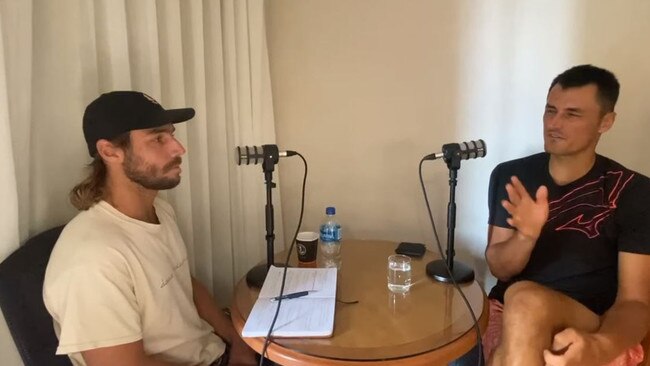
Asked if he was playing tennis still now aged 30 to prove anything to himself or others or purely for enjoyment, Tomic admitted he’d come close to quitting altogether.
“Last four years I spiraled out of control a bit, trying to figure out who I was, trying to get all of these pieces of the puzzle back together and that was partially my fault,” Tomic says. “Everything got to me a little bit, I didn’t handle it quite well. I made it very clear to myself about a year ago, (when) I was 900 in the world, and I thought ‘Should I play, should I not?’, “I decided I’m going to try my best, to get back to the top 100, top 50, not to prove to anyone, more to prove to myself because I feel I still have a good four to five years ahead of me.”
Tomic said he believed he could get back in the top 50 but it would take time, lack of injuries and a new “level” of tennis.
“I can get back to where I should be. You still have to stay healthy and everything has to fall back into place. That’s one of the big concerns, if I come back to 200 now, and I get injured, stuff can happen.
“If everything goes to plan and I stay healthy and not injured I believe I can get back to the top 100, top 50 but it’s going to require a lot of matches, a lot of work and it’s not going to be easy because everything has changed. The level is going up you know.”
Tomic has surged his ranking in the past year from nearly 900 in the world to 292 and said he hoped to be near the 200 mark by the end of the season and continue to build it next year.
He also touched on where he’d like to base himself when his career finishing, tipping the Sunshine Coast “where it’s relaxing and not too many people - the Gold Coast is still too busy, too packed, something constantly to do.
“I just want to be left alone when I stop playing tennis so probably Sunny Coast somwhere, Byron even.”
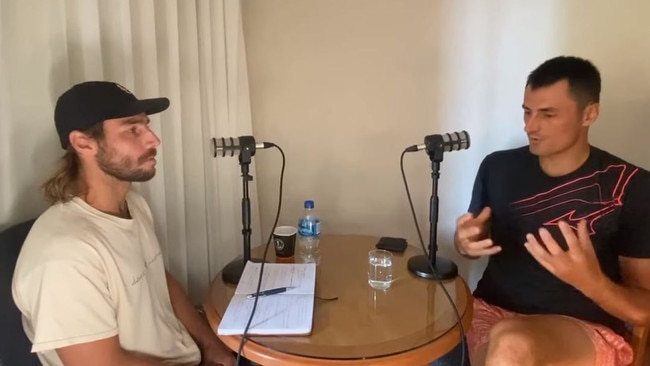
During the wide-ranging podcast chat, Tomic also talks about his “tanking” reputation and how many players do it but more “professionally” to cover it up and how his languid, efficient technique and style on court was honed from knowing he had to last eight or nine hours a day training as a kid: “I was training that long so that automatically said to me ‘Bernard you need to survive...shots, strokes, everything has to be efficient.”
Here are some highlights.
CALUM PUTTERGILL: What’s it been like travelling with your girlfriend and not having a serious entourage around you and not having that pressure, obviously you have a lot of experience and kind of know what you need to do, you’ve been to the high level, but what’s it been like just travelling with a girlfriend, when you don’t have anyone making sure you are accountable?
BERNARD TOMIC: Good point, good question because I kind of like it, I’ve always kind of liked not having that pressure of coaches and stuff. I spent a lot of time when I was younger with a lot of people around, my dad, and trainers and this person and it was always full on. I just took a step back from it all and I just wanted to just figure it out myself. These last past couple of years haven’t been that great, I haven’t played that much tennis as well which is kind of an excuse for that. But I’m just happy to be back (now) playing at a better level, travelling with a missus is always good.
CP: I don’t know what you think but it’s been a pretty friendly around the Challenger tour lately. It’s been a good atmos, do you feel like it’s more friendly, people are pretty private at the (main) tour level?
BT: Yeah you’re right in that, everything is more serious when you get up there so I think at this Challenger level it’s quite interesting because I’ve got to know a few people a bit deeper and I think it’s fun. I actually enjoy being around people now, seeing what’s everyone about, how they go about things, it’s quite interesting to see.

CP: Your girlfriend seems super supportive. It’s always interesting when you start dating someone who has no idea about tennis, you’re explaining how to score which is super confusing for someone who has never played, but she seems super supportive and getting to know her, such a cool chick, you’ve picked well there.
BT: She’s pretty good. Early on she didn’t have a clue, scoring, whether you lost. I think the first time I played she said did you win or lose - she didn’t know (laughs). She didn’t have a clue. But she’s gotten to know a little bit better now and the only bad side is that sometimes she thinks she can help after and I’m like ‘you have noooo clue’. (laughs). I still listen to her and hear what she has to say. But it’s actually quite good for me because I was used to a lot of pressure at a young age, lot of coaches, lot of people around me and I just want to get away from all that and be on my own, and just kind of feel it and absorb everything alone and that’s the beauty about it and that’s what I’ve come to realise the last few years is it’s actually quite enjoyable if you go at it. I know we’ve said my tennis hasn’t been that great, I haven’t played that much but I’ve started to play much better the last six months.

CP: Dude it’s just epic to see you playing for you. The kind of pressure you had because of the trajectory you were on as a junior, it’s intense, not many have felt that in the world, not many people had as illustrious junior career, as you, or quarter finals of Wimbledon (as a teenager), it’s cool to see you playing for you, and playing for enjoyment and tickle the ball around and have a different relationship with it and not have people breathing down your neck and a lot of pressure.
BT: Yeah exactly, I remember those times, it was huge, a lot of expectation when I got to quarters at Wimbledon at 18 from qualies, was top 40, 50, top 30 by 19. I handled it quite well for four or five years but 23, 24, I think 24 I spiralled down to 250 (in the world) and 25 came back to top 60, so closer to 25, 26, I had a break from it mentally, didn’t train and took time away and my ranking started to fall and Covid happened and that was three or four years that I lost pretty quickly. But the last year was good, I was about 900 in the world and now back to 300. I’m still quite young I should say in my sport, 30. 30 is okay. I’m happy where I’m going, I still reckon I need a little bit more time, because the depth has increased so much in the sport of tennis - all these guys, 300, 400 in the world, they’re all good, can all be top 100, there’s only 100 spots and you need to crack through that 200, 300 mark. There’s a couple of 100 players you need to beat to get to the top 100 so let’s see if I can do it in the next six months, one year and yeah, it’ll be good for me.
CP: As a kid what motivated you to be a professional tennis player as a 10 year old?
BT: It wasn’t ‘I want to make X money from tennis’. It was more the sport of tennis and enjoyment of tennis and I think once I started winning and playing a lot of matches when I was younger, that drove me to play more and more. I spent a lot of hours on the court practicing when I was young and that was one of the reasons I was really good at 16, 17, 18. I was winning matches at the Australian Open at 15, 16. I did work very hard.
CP: How many hours would you do a day in teenage years?
BT: An easy day would be like five or six, a tough day would be eight, nine. It was ridiculous. But don’t forget I started tennis at eight. Others people started are like two (years old), three, four. So I missed all that four, five years being three years old, five years picking up a racquet. I did put a lot of work in and that led to great results.
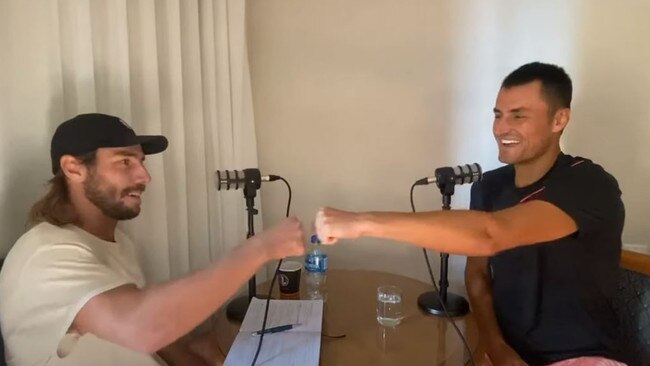
CP: I remember your first Aussie Open with the sunnies on, you beat (Potito) Starace, do you remember that match?
BT: I remember, I got the wildcard and I think that’s when I won the youngest match at the Australian Open, I was playing well. I was really good early. I remember that not like it was yesterday but it was a memory.
CP: Playing the biggest matches, I have never seen you melt rackets, smack balls out or swear - do you get angry on court and how have you managed that side so well?
BT: That’s a good question and people ask me this all the time, ‘why don’t you get angry like other players, you have this personality that is calm on the court’. To be honest, probably the honest answer was my care factor was not enough. That’s the only answer I can come up with that’s logical. I didn’t care as much as other players. If I did care I would have been much much better and maybe let’s say been a potential grand slam champion, but I did not care. People are like ‘On court why does look like he doesn’t care, why isn’t he throwing racquets?’. Because I didn’t care as much other players…and maybe it helped me play like that and maybe that’s why I always played that good because I was relaxed and could get away with all my shots and have fun. Of course I did care but you can see other players put in blood, sweat, tears, years. Whereas with me it just became...when I was on court, I always thought about it as a game. It wasn’t ‘Oh so stressful and I need to win this point’. I would sort of go through the motions and whatever happens, happens. If I lose a match it’s the same thing if I win. It’s the same to me.
CP: Do you think you felt a bit like that because you put so much work in as a young kid, you were a bit fried, overdone, by your early 20s?
BT: By 24, 25, I lost that bit of drive, even that care factor when I didn’t have that much care factor (to begin with), I lost that. And yeah, it took me a couple of years to rebuild and get it back from last year. I have four or five years left, I may as well come back to tennis, get back to top 100, not for anyone, just myself. I’m still capable of playing really good tennis.
CP: I was thinking when I asked if you wanted to have this chat, I have tanked matches before in my life, when feeling overwhelming pressure and can’t deal with it anymore and the best solution for me is I can’t deal with it, too much going on in my head, feeling victimized in the sport, not making money of this. What goes through your head when tanking a match?
BT: Yeah I’ve done that in the past for sure. And at the time, that’s when I did care more. I think I did care more but things weren’t going my way and I was relying on my talent. I was a better player than my opponent, but losing. Usually what happens when you tank is you know you are better than the guy, you have more talent than the guy but that’s when it gets to your head, all these thoughts. I think the period I tanked the most was when I cared the most. Even though my care factor was not like other people, I think that is one of the reasons I would tank was to get it all out of my system. But it’s not the right thing. I will say some people do it in a professional manner, other people don’t. I haven’t done it in a professional manner. You can see it in my body language. You can see I’m not there. As opposed to someone else tanking, they will do it subtley, you can see they are done but they are still sort of there, you know.
CP: I remember that in match point in Rome, on dirt, maybe Madrid and you flipped the racquet (around the other way to receive serve).
BT (laughs). Well to be honest with you man, nothing was going my way, I was playing (Fabio) Fognini and it was like, ‘If it’s not going to work this way, it might work this way, nothing is going my way, I’ve got more chance this way’. I didn’t think of it as a tank - I just thought I might have more chance hitting it this way.
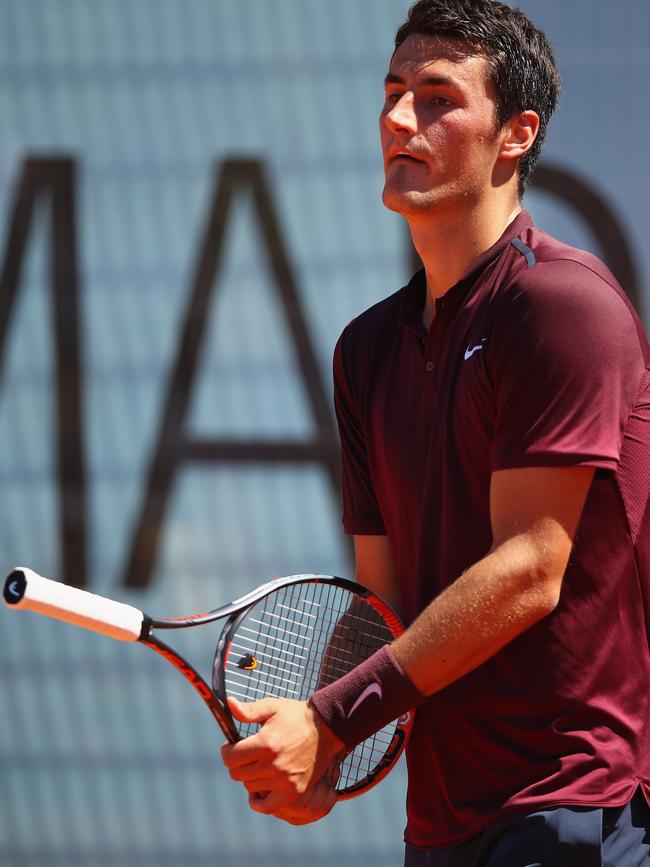
CP: How has it been dealing with mainstream media? I feel you’ve copped it pretty hard. How’s it been for you, your wellbeing, dealing with media through your whole life. Especially now, if all that stuff you went through happened now you’d probably deal with it better, you were just so young then?
BT: If it was now I would handle it differently. I’ve looked at stuff I’ve said and done in the past.
CP: I think it’s the (media) fault, angle they try to take.
BT: : Exactly you are sort of seen as bad boy and media can always build you up and they can tear you down. The bigger they are, the harder they fall. They can bring you up, there’s a lot of positives but they can also bring you down.
If I handled it now, last couple of years, as I’m more mature, I’d handle it differently but when thrown upon it at a young age it hits you, it’s like, you don’t know what to say, what not to say. Of course I said a lot of dumb things in the past when I was younger and for sure I probably shouldn’t have said those things. But you just learn, other people learn quickly, other people learn later. I guess I was just one of those people who learn later. You can do 50, 100 good things and media will remember you for one bad thing. You can do so many good things but if you do one bad thing, they will remember that bad thing. They forget about the 40 good things you’ve done. That’s the problem, They took too much of my bad things and and kept it there - and people here and there remember me for the bad.
CP: Where do you think you’ll end up living when you finish?
BT: Yeah somewhere where it’s relaxing, not too may people. Gold Coast is still too busy, to packed, constantly something to do. I just want to be left alone, when I stop playing tennis after those three or five years, probably Sunny Coast somewhere there, Byron even, I’m not sure.
CP: So you have a pretty unique technique, super efficient. I have a theory and remember telling you this the other day: Agassi, as well is someone who would have put in that many hours, ball fed. You were on court so many hours as a kid, was your technique moulded to be efficient and hit balls over and over or did someone just purposely create your technique, Mark (Draper) or your Dad?
BT: You say Marksy (Mark Draper). Mark helped a lot with my game. He played this funky game, similar to what I play now and I had to adapt to playing him in games and sets and that’s one of reason I play so funky and strange because many of our rallies were like this, slice to slice change up and he was slicing the line and I would have to learn that at a young age, how to beat this guy. He was older than me, better than me. But at a young age on court, I was in more survival mode. Surviving on court, knowing I have to put four, five hours, eight maybe nine hours, so my automatic system in my brain was to survive. It wasn’t like I was going to train an hour or two, like normal. I was training that long so that automatically said to me ‘Bernard you need to survive - your shots, strokes, everything has to be efficient’ because I knew how much work I had to put in. And that’s probably one of the reasons my game became very efficient.
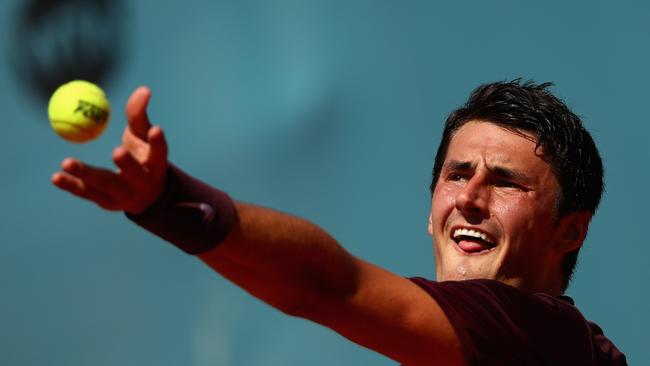
CP: Efficiency is definitely a massive strength, learning to play efficient. It’s the opposite to like Rafa, exerting max energy. If you look at footwork, it looks like you’re barely moving, no unnecessary steps.
BT: Exactly. I always had that anticipation on court, to know where the next ball was going. I was probably one of the best in the world to do this, knowing where next ball was going, knowing where to put ball and where not to put the ball. I didn’t really need to move because I was so tall so I only put in one, two steps and sort of glide on the court. People move, move, move and I just glide, turn my body. I don’t really move so it was very efficient. Sometimes it looks like I’m barely moving.
CP: When I was at school year 11, 12, 13, you get in the social scene, start getting invited to parties, it’s kind of a bit of a crossroads. I probably I could have put in more. I was a social dude and felt like I was missing out on stuff, going to tournaments, training. Did you feel you were misisng out on things or you had so much tennnis in front of you, you weren’t aware?
BT: Yeah I did think about that stuff - that’s partly why I got away from it at 24, 25, sort of got to do normal things the past few years and not be too much around tennis and not take life too seriously. Back when a kid, it was always tennis, tennis, tennis so yeah I didn’t get to live the normal life of a kid. That’s going to school, hanging with mates, growing up 15, 17 going to parties. I only caught up to those things three or four years ago , started doing a bit more, being more normal and stuff - and I was like, you know what, I wanted to be normal. To feel normal for a bit, take the spotlight out off myself. I was happy where I was, starting to get into a very happy place because tennis is a tough sport. Since I was eight or nine years old, every day, committing, committing, committing. When you get to 24-25, it was almost 18 to 20 years hard work. Then I started being normal, going to parties, I went through that phase as well.
CP: What do you think of Novak (Djokovic), mates with him?
BT: As a person he’s a great guy. I think he might be the best player of all time. I don’t think anyone will ever catch up to that in the sport of tennis. As a person he gives back. He tries to help other people, he knows what it’s like for people 100, 200 300 in the world. That’s where tennis needs to improve - what it does for people 150 to 300 in the world.
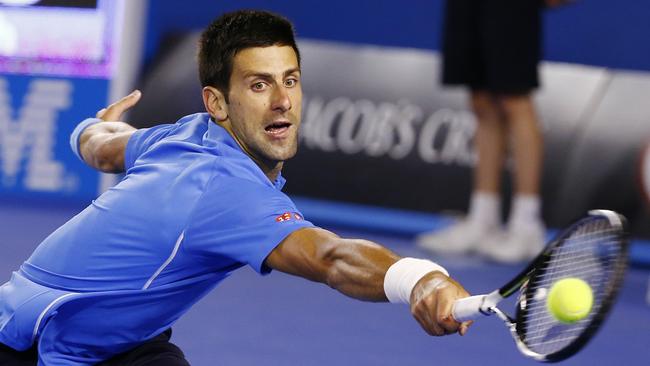
CP: If you had kids would you get your kids into tennis?
BT: Probably not just because, what am I 30, it’s been 22 years, it’s an overdose of tennis. After my career, I don’t think I‘ll go too much towards tennis. I just want to get away from it you know. I can’t answer that. because I don’t know what will happen next three to four years. It could be easy to let it go, for some people it isn’t.
CP: When you are well known, people love to be associated with you, want a piece of you, especially girls wise - have you found it hard to sift through whether a friend or girlfriend is in it for the right reasons and is genuine, has that been an issue at all?
BT yeah in Australia I’ve experience things in the fast lane growing up and yeah sometimes people can be fake, sometimes it’s not cool, girls as well can cause drama, you have to be careful and onto that. I was a bit disappointed as well because every person I met was like not really there. Then when you were sure had these things that were alarming in the back of your head...and you tell yourself it’s not true...but you have to realise at end of day you are in spotlight, you are known, I can’t say too much but I met Keely and she’s pretty good girl, so far it’s going well, I just saw a lot of fake people in my life and it’s kind of disappointing...people will act a certain way to get what they want or get stuff out of you or whatever, I was pretty disappointed. It’s not every day you meet someone like you, you’re a good man, you can see it you’ve got a great spirit and great person. I’ve met some users.
CP: Bernie it’s been sick hanging with you the last couple of weeks and thanks for coming and chatting with me today it’s been good times. Cheers dude, I back you, you’re a good dude.
BT: No problem. Appreciate it, thanks for having me.
TO WATCH THE FULL CHAT, SEE CALUM PUTTERGILL’S ‘HOLISTIC TENNIS PERSPECTIVE’ ON YOUTUBE
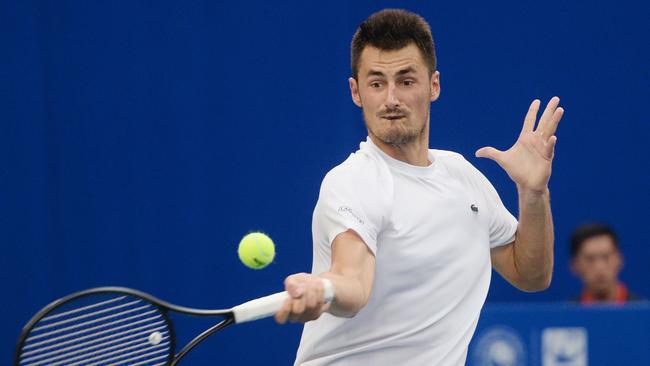

Add your comment to this story
To join the conversation, please log in. Don't have an account? Register
Join the conversation, you are commenting as Logout
Gold Coast dancer busts a move to represent Australia
Gold Coast’s Hanon Taira will compete for a chance to represent Australia at one of the world’s biggest street dancing competitions. SEE THE VIDEO
‘Idiots’ spotted dangling from 246m tower on the Gold Coast
Police have responded to a shocking stunt video of up to five people who were spotted dangling from the top of a 246m tower on the Gold Coast. Watch the video